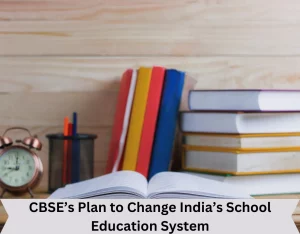ForumIAS announcing GS Foundation Program for UPSC CSE 2025-26 from 27th May. Click Here for more information.
Source: The post e CBSE’s plan to change India’s school education system has been created, based on the article “Language & learning” published in “Indian express” on 3rd February 2024.
UPSC Syllabus Topic: GS Paper2-governance-Issues relating to development and management of Social Sector/Services relating to Education.
News: CBSE’s Plan to Change India’s School Education System, The article discusses the CBSE’s plan to change India’s school education system. It will require more languages and subjects to be studied. This aims to mix academic and vocational training but raises concerns about student workload and language issues.
What Changes has The CBSE Proposed?
Introduction of More Languages: Students up to Class X will study three languages instead of two, with at least two being native Indian languages. Higher secondary students will study two languages, with one being a native Indian language.
Increased Number of Subjects: At the secondary level, students must now clear 10 subjects, up from the current five. For higher secondary education, the requirement is six subjects instead of five.
Combination of Academic and Vocational Education: The new framework aims to integrate academic learning with vocational skills, following the National Education Policy (NEP) 2020.
Credit System for Extra-Curricular Skills: A new credit bank system will recognize, and reward skills obtained outside the classroom.
What Would be The Impact of These Changes?
Improved Learning Outcomes: Studying multiple languages, as per the new framework, is expected to enhance overall learning and skill development.
Potential Increase in Student Workload: With the requirement to clear more subjects, there might be an increased academic burden on students.
Integration of Vocational Education: The new system aims to combine academic and vocational training, aligning with NEP 2020’s objectives.
Linguistic and Political Challenges: The introduction of the three-language policy, especially in South India, raises concerns about language-based tensions, evident in Tamil Nadu’s resistance to the NEP.
Difficulty in Language Teacher Availability: Implementing diverse language options could be challenging due to a shortage of qualified language teachers, potentially leading to a push towards teaching Hindi.
Want To Know More Topics-
Way forward
The CBSE must ensure broad consultations to respect all sensitivities and avoid reopening old fault lines. It’s important to carefully implement the new system, considering the workload on students and the political and linguistic concerns, especially in regions like South India.
Question for practice:
Examine the proposed changes by CBSE in India’s school education system, including the introduction of more languages and subjects, and their potential impacts.





